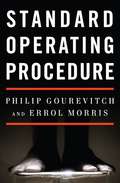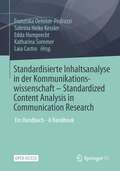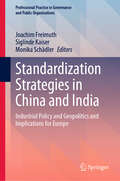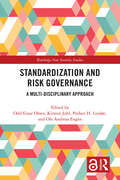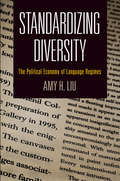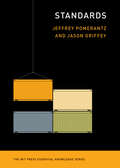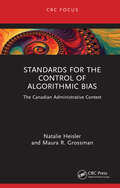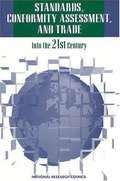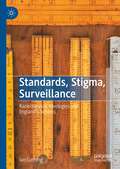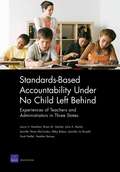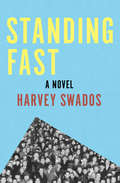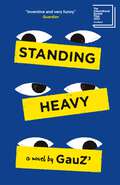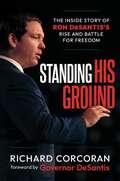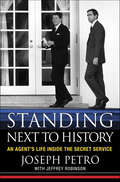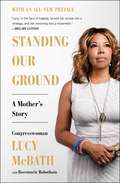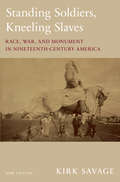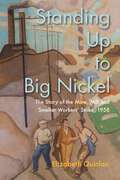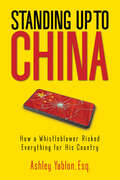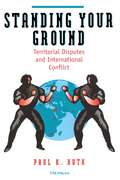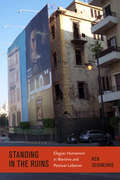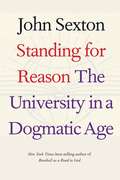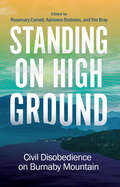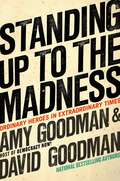- Table View
- List View
Standard Operating Procedure
by Philip Gourevitch Errol Morris"Standard Operating Procedure" is a war story that takes its place among the classics. It is the story of American soldiers who were sent to Iraq as liberators only to find themselves working as jailers in Saddam Hussein's old dungeons, responsible for implementing the sort of policy they were supposed to be fighting against. It is the story of a defining moment in the war, and a defining moment in our understanding of ourselves; the story of the infamous Abu Ghraib photographs of prisoner abuse, as seen through the eyes, and told through the voices, of the soldiers who took them and appeared in them. It is the story of how those soldiers were at once the instruments of a great injustice and the victims of a great injustice. In a tradition of moral and political reckoning, and all-powerful story- telling, that runs from Joseph Conrad's "The Heart of Darkness" and Fyodor Dostoevsky's "The Grand Inquisitor" to Norman Mailer's "The Executioner's Song, Philip Gourevitch" has written a relentlessly surprising and perceptive account of the front lines of the war on terror. Drawing on more than two hundred hours of Errol Morris's startlingly frank and intimate interviews with the soldier-photographers who gave us what have become the iconic images of the Iraq war, "Standard Operating Procedure" is a book that makes you see, and makes you feel, and above all makes you think about what it means to be human. It is an utterly original book that stands to endure as essential reading long after the current war in Iraq passes from the headlines. A work of searing power from two of our finest masters of nonfiction, working at the peak of their powers.
Standardisierte Inhaltsanalyse in der Kommunikationswissenschaft – Standardized Content Analysis in Communication Research: Ein Handbuch - A Handbook
by Katharina Sommer Edda Humprecht Franziska Oehmer-Pedrazzi Sabrina Heike Kessler Laia CastroIm vorliegenden Open-Access Handbuch wird der Status Quo standardisierter, inhaltsanalytischer Forschung in der Kommunikationswissenschaft identifiziert, systematisiert und für Forschende und Studierende zugänglich gemacht. Es behandelt Themen- und Forschungsbereiche des Nachrichtenjournalismus, der fiktionalen Inhalte sowie der Kommunikation von professionellen und LaienkommunikatorInnen. Der Fokus liegt auf den zentralen Fragestellungen und Forschungsdesigns unter besonderer Berücksichtigung der verwendeten Konstrukte/Variablen. In der dazugehörigen Datenbank „Database of Variables for Content Analysis – DOCA“ werden Variablenbeschreibungen zusammengetragen und recherchierbar gemacht. Das Handbuch bietet hierfür den kontextuellen Rahmen. Zusammen bilden sie die Grundlage zur Vereinheitlichung und damit Vergleichbarkeit inhaltsanalytischer Studien.
Standardization Strategies in China and India: Industrial Policy and Geopolitics and Implications for Europe (Professional Practice in Governance and Public Organizations)
by Joachim Freimuth Monika Schädler Siglinde KaiserIn today's digital era, the significance of standards in modernization and innovation cannot be overstated. Often overlooked as purely technical aspects, they today reveal their profound economic and political impact. Focusing on India and China, this book sheds light onto the standardization approaches of these two dynamic nations. With insights from both academic and practical perspectives, this book shows how China's centralized planning and structured institutions contrast with India's emerging hybrid model, which reflects its rich diversity. Both countries possess untapped technological potential that is poised to reshape the global standardization landscape. What do these developments mean for the German and European economies? Find out in the concluding chapters as the authors explore the implications of these standardization trends on a global scale. This book is essential reading for professionals navigating the ever-evolving intersection of modernization, innovation, and global standards, as well as for researchers interested in a better understanding of standardization strategies.
Standardization and Risk Governance: A Multi-Disciplinary Approach (Routledge New Security Studies)
by Ole Andreas Engen Odd Einar Olsen Kirsten Voigt Juhl Preben LindøeThis multi-disciplinary book conceptualises, maps and analyses ongoing standardisation processes of risk issues across various sectors, processes and practices. Standards are not only technical specifications and guidelines to support efficient risk governance, but also contain social, political, economic and organizational aspects. This book presents a variety of standardization processes and applications of standards that may influence our judgements of risk, the organizing of risk governance, and accordingly our ways of behaviour. Standardization and standards can impact risk governance in different ways. The most important lessons drawn from the present volume can be summarized under three areas: (a) how standardization might impact on power relations and interests; (b) how standardization may change flexibility in decision-making, communication, and cooperation; and (c) how standardization could (re)direct attention and risk perception. The volume’s purpose is to present an analysis of standardisation processes and how it impacts on our thinking about risk, how we organise risk governance and how standardisation may influence on risk management. In so doing, it contributes to a more informed discourse regarding the use of standards and standardisation in contemporary risk management. This book will be of much interest to students of risk, standardisation, global governance and critical security studies.
Standardizing Diversity: The Political Economy of Language Regimes (National and Ethnic Conflict in the 21st Century)
by Amy H. LiuLanguages have deep political significance beyond communication: a common language can strengthen cultural bonds and social trust, or it may exacerbate cultural differences and power imbalances. Language regimes that emerge from political bargains can centralize power by favoring the language of one ethnolinguistic group, share power by recognizing multiple mother tongues, or neutralize power through the use of a lingua franca. Cultural egoism, communicative efficiency, or collective equality determines the choice. As Amy H. Liu demonstrates, the conditions surrounding the choice of a language regime also have a number of implications for a nation's economy.Standardizing Diversity examines the relationship between the distribution of linguistic power and economic growth. Using a newly assembled dataset of all language-in-education policies in Asia from 1945 to 2005 and drawing on fieldwork data from Malaysia and Singapore, Liu shows language regimes that recognize a lingua franca exclusively—or at least above all others—tend to develop social trust, attract foreign investment, and stimulate economic growth. Particularly at high levels of heterogeneity, the recognition of a lingua franca fosters equality and facilitates efficiency. Her findings challenge the prevailing belief that linguistic diversity inhibits economic growth, suggesting instead that governments in even the most ethnically heterogeneous countries have institutional tools to standardize their diversity and to thrive economically.
Standards (The MIT Press Essential Knowledge series)
by Jeffrey Pomerantz Jason GriffeyAn engaging introduction to standards, the invisible infrastructure that shapes the built and digital environments of the modern world.Standards are the DNA of the built environment, encoded in nearly all objects that surround us in the modern world. In Standards, Jeffrey Pomerantz and Jason Griffey provide an essential introduction to this invisible but critical form of infrastructure—the rules and specifications that govern so many elements of the physical and digital environments, from the color of school buses to the shape of shipping containers. In an approachable, often outright funny fashion, Pomerantz and Griffey explore the nature, function, and effect of standards in everyday life. Using examples of specific standards and contexts in which they are applied—in the realms of technology, economics, sociology, and information science—they illustrate how standards influence the development and scope, and indeed the very range of possibilities of our built and social worlds. Deeply informed and informally written, their work makes a subject generally deemed boring, complex, and fundamentally important comprehensible, clear, and downright engaging.
Standards for the Control of Algorithmic Bias: The Canadian Administrative Context
by Natalie Heisler Maura R. GrossmanGovernments around the world use machine learning in automated decision-making systems for a broad range of functions. However, algorithmic bias in machine learning can result in automated decisions that produce disparate impact and may compromise Charter guarantees of substantive equality. This book seeks to answer the question: what standards should be applied to machine learning to mitigate disparate impact in government use of automated decision-making? The regulatory landscape for automated decision-making, in Canada and across the world, is far from settled. Legislative and policy models are emerging, and the role of standards is evolving to support regulatory objectives. While acknowledging the contributions of leading standards development organizations, the authors argue that the rationale for standards must come from the law and that implementing such standards would help to reduce future complaints by, and would proactively enable human rights protections for, those subject to automated decision-making. The book presents a proposed standards framework for automated decision-making and provides recommendations for its implementation in the context of the government of Canada’s Directive on Automated Decision-Making. As such, this book can assist public agencies around the world in developing and deploying automated decision-making systems equitably as well as being of interest to businesses that utilize automated decision-making processes.
Standards, Conformity Assessment, and Trade: Into the 21st Century
by International Standards Conformity Assessment U.S. Trade Policy Project CommitteeMandated standards used for vehicle airbags, International Organization for Standards (ISO) standards adopted for photographic film, de facto standards for computer software--however they arise, standards play a fundamental role in the global marketplace.Standards, Conformity Assessment, and Trade provides a comprehensive, up-to-date analysis of the link between standards, product testing and certification, and U.S. economic performance. The book includes recommendations for streamlining standards development, increasing the efficiency of product testing and certification, and promoting the success of U.S. exports in world markets.The volume offers a critical examination of organizations involved in standards and identifies the urgent improvements needed in the U.S. system for conformity assessment, in which adherence to standards is assessed and certified. Among other key issues, the book explores the role of government regulation, laboratory accreditation, and the overlapping of multiple quality standards in product development and manufacturing.In one of the first treatments of this subject, Standards, Conformity Assessment, and Trade offers a unique and highly valuable analysis of the impact of standards and conformity assessment on global trade.
Standards, Stigma, Surveillance: Raciolinguistic Ideologies and England’s Schools
by Ian CushingThis book traces raciolinguistic ideologies in England’s schools, focusing on post- 2010 policy reforms which frame the language practices of low-income, racialised speakers as limited and deficient. Across interviews, policy mechanisms and classroom observations, the author shows how raciolinguistic ideologies are rooted in British colonial logics which continue to shape contemporary education policy. He shows how these policies require marginalised speakers to modify their speech patterns in line with normative standards of whiteness under new guises of social justice and research robustness. Finally, new visions for language education and linguistic justice are offered, demonstrating how teachers can see themselves as language activists to identify, resist and reject faults in a hostile and oppressive policy architecture. This book draws on fields including critical language policy, educational sociolinguistics, genealogy, raciolinguistics and critical language awareness.
Standards-Based Accountability Under No Child Left Behind
by Brian M. Stecher Laura S. Hamilton Jennifer Sloan Mccombs Julie A. Marsh Abby RobynSince 2001-2002, standards-based accountability provisions of the No Child Left Behind Act of 2001 have shaped the work of public school teachers and administrators in the United States. This book sheds light on how accountability policies have been translated into actions at the district, school, and classroom levels in three states.
Standing Fast: A Novel
by Harvey SwadosA masterful novel of political progressives making their way—and not—in an ever-changing postwar AmericaFor Marty Dworkin and his band of young Trotskyist dreamers in Buffalo, New York, the vision of a just, socialist world crumbles with the rise of Stalin and the chaos of World War II. In the two decades that follow, Dworkin and his idealistic colleagues strive to establish a new political party and battle through unexpected trials with family, work, aging, and the changing world. They run up against an increasingly conservative America and a thriving materialism directly opposed to their own fervent beliefs. They emerge humbled, but still hopeful, into the 1960s, when civil rights struggles and anti-war radicalism move to center stage. Standing Fast is a classic, panoramic portrait of life amid the shattered dreams and visionary ambitions of the American left.
Standing Heavy
by Gauz"One of those rare, transformative novels" KARIM MISKE"Funny and poignant" TIFFANY TSAO, author of The MajestiesInitially a little intrigued, all babies eventually return the security guard's smile.The security guard adores babies. Perhaps because babies do not shoplift.Babies adore the security guard. Perhaps because he does not drag babies to the sales.The 1960s - Ferdinand arrives in Paris from Côte d'Ivoire, ready to take on the world and become a big somebody.The 1990s - It is the Golden Age of immigration, and Ossiri and Kassoum navigate a Paris on the brink of momentous change.The 2010s - In a Sephora on the Champs-Élysées, the all-seeing eyes of a security guard observes the habits of those who come to worship at this church to consumerism.Amidst the political bickering of the inhabitants of the Residence for Students from Côte d'Ivoire and the ever-changing landscape of French immigration policy, Ferdinand, Ossiri and Kassoum, two generations of Ivoirians, attempt to make their way as undocumented workers, taking shifts as security at a flour mill.Sharply satirical, political and poignant, Standing Heavy is a searingly witty deconstruction of colonial legacies and capitalist consumption, an unprecedented and unforgettable account of everything that passes under a security guard's gaze.Translated from the French by Frank Wynne"A formidable keenness of observation and a sarcastic wit" La Croix"Political satire with the air of a poetry slam" Stylist
Standing His Ground: The Inside Story of Ron Desantis's Rise and Battle for Freedom
by Richard CorcoranContrary to what the mainstream media has claimed, Florida under Ron DeSantis has become the home for freedom and individual liberty.At the onset of the pandemic, political leaders throughout the country were forced to quickly make significant decisions about how they would govern under extraordinary circumstances. A number of these decisions simply required instinct—they just had to come from the gut. There was little, if any, precedent to examine, and hardly any time for the usual gambits to test potential solutions. One person became a household name and a national hero for having made what proved to be the best decisions over and over: Ron DeSantis, the 46th governor of Florida. However, not surprisingly, his success also begot wrath. A patriot to millions of everyday Americans is often a &“tyrant&” to progressive elites. Other than perhaps former President Donald Trump, DeSantis was and remains the most vilified elected official in media, politics, entertainment, academia, and now the corporate world. Conservatives know full well this means he hit the bullseye. Now that more than two years have passed, the American people are able to clearly see whose decisions struck the proper balance between liberty and safety. There&’s no denying that DeSantis&’s influence soared as the world watched him successfully steer his state step by step through one of the greatest periods of turmoil and uncertainty in modern history. While many other states floundered, Florida didn&’t just survive—it flourished.
Standing Next to History: An Agent's Life Inside the Secret Service
by Jeffrey Robinson Joseph PetroA former Secret Service agent revisits his twenty-three-year career, including his time as Ronald Reagan’s bodyguard, in this “engaging” memoir (Publishers Weekly).Joseph Petro served for twenty-three years as a special agent in the United States Secret Service, eleven of them at the White House and four of those as the man on the shoulder of Ronald Reagan.From his days as an investigator in the field, to his time as the man on whom the life of the president depended, Petro’s journey through history is a singular look inside the most discreet law enforcement agency in the world; an unparalleled insight into Ronald and Nancy Reagan; plus an up-close-and-personal view of the late Pope John Paul II, whom Petro protected during his historic and extraordinary ten-day tour of the United States in 1987.The cast of characters in these never-before-told stories ranges from the Reagans and the Pope, to Frank Sinatra, Bob Hope, Mikhail Gorbachev, Fidel Castro, Margaret Thatcher, François Mitterrand, the Shah of Iran, George H. W. Bush, Dan and Marilyn Quayle, Henry Kissinger, Nelson Rockefeller, Gerald Ford, and would-be assassins.“A close-in view of how ‘the Great Communicator’ charmed critics and won loyal followers.” —The Christian Science Monitor“A fascinating portrait of Secret Service life.” —Library Journal
Standing Operating Procedures for Developing Acute Exposure Guideline Levels for Hazardous Chemicals
by Subcommittee on Acute Exposure Guideline LevelsStanding Operating Procedures for Developing Acute Exposure Guideline Levels for Hazardous Chemicals contains a detailed and comprehensive methodology for developing acute exposure guideline levels (AEGLs) for toxic substances from inhalation exposures. The book provides guidance on what documents and databases to use, toxicity endpoints that need to be evaluated, dosimetry corrections from animal to human exposures, selection of appropriate uncertainty factors to address the variability between animals and humans and within the human population, selection of modifying factors to address data deficiencies, time scaling, and quantitative cancer risk assessment. It also contains an example of a summary of a technical support document and an example of AEGL derivation. This book will be useful to persons in the derivation of levels from other exposure routes—both oral and dermal—as well as risk assessors in the government, academe, and private industry.
Standing Our Ground: The Triumph of Faith Over Gun Violence: A Mother's Story
by Rosemarie Robotham Lucia Kay McBathFrom the national spokesperson for Everytown for Gun Safety and leading gun violence prevention advocate comes the riveting memoir of a mother’s loss and call to action, as well as a faith-based exploration of how the nation’s gun laws put a deadly target on American lives.Lucia Kay McBath knew deep down that a bullet could one day take her son. After all, she had watched the news of countless unarmed black men unjustly gunned down. Standing Our Ground: Putting Faith in God Over Faith in Guns is McBath’s memoir of raising, loving, and losing her son to gun violence, and the story of how she transformed her pain into activism. After seventeen-year-old Jordan Davis was shot by a man who thought the music playing on his car stereo was too loud, the nation grieved yet again for the unnecessary loss of life. Here, McBath goes beyond the timeline and the assailant’s defense—Stand Your Ground—to present an emotional account of her fervent fight for justice, and her awakening to a cause that will drive the rest of her days. But more than McBath’s story or that of her son, Standing Our Ground keenly observes the social and political evolution of America’s gun culture. A must-read for anyone concerned with gun safety in America, it harkens back to such bestsellers as The Short and Tragic Life of Robert Peace and Nobody.
Standing Soldiers, Kneeling Slaves: Race, War, and Monument in Nineteenth-Century America, New Edition
by Kirk SavageThe United States began as a slave society, holding millions of Africans and their descendants in bondage, and remained so until a civil war took the lives of a half million soldiers, some once slaves themselves. Standing Soldiers, Kneeling Slaves explores how the history of slavery and its violent end was told in public spaces—specifically in the sculptural monuments that came to dominate streets, parks, and town squares in nineteenth-century America. Looking at monuments built and unbuilt, Kirk Savage shows how the greatest era of monument building in American history took place amid struggles over race, gender, and collective memory. Standing Soldiers, Kneeling Slaves probes a host of fascinating questions and remains the only sustained investigation of post-Civil War monument building as a process of national and racial definition. Featuring a new preface by the author that reflects on recent events surrounding the meaning of these monuments, and new photography and illustrations throughout, this new and expanded edition reveals how monuments exposed the myth of a "united" people, and have only become more controversial with the passage of time.
Standing Up to Big Nickel: The Story of the Mine, Mill and Smelter Workers Strike, 1958
by Elizabeth QuinlanAll miners and smelter workers know the folly of going on strike when their employer holds a stockpile. In 1958 the International Nickel Company had enough nickel on hand to guarantee sales for at least six months. Despite this, fourteen thousand miners and smeltermen in Sudbury, Ontario, downed their tools and struck against the corporate titan of the mining industry.Standing Up to Big Nickel is a comprehensive portrait of a pivotal strike by the International Union of Mine, Mill and Smelter Workers, a union that has inspired exceptional levels of solidarity among its members. The Cold War and the resulting instabilities in the Canadian labour movement form the backdrop to Elizabeth Quinlan’s engrossing analysis. The union straddled the line, she shows, between its historical commitment to working-class struggle and the newly restrictive legal landscape of the postwar era. Retrospective accounts by surviving union members, leaders, family, and community members bring to life the history of a distinctive group of workers who sweated over smelter furnaces and toiled underground in perilous conditions.Quinlan traces the events before, during, and after one of Canada’s greatest strikes in both magnitude and duration. Featuring biographical sketches and scenes based on archival and documentary data, Standing Up to Big Nickel captures an intensely dramatic juncture in Canadian labour history.
Standing Up to China: How a Whistleblower Risked Everything for His Country
by Ashley YablonWhat would you do if your ambitious career suddenly transformed into a deadly game of international espionage? A true-life thriller equal to that of a heart-stopping John Grisham novel, Ashley Yablon's story takes readers into the dark crevices of deceit and corporate greed of one of the world's most powerful Chinese telecom giants. As the freshly minted General Counsel for telecom company ZTE, Yablon uncovers an illegal scheme selling billions of dollars' worth of surveillance equipment to embargoed countries. If left unchecked, these transactions could threaten the security of the United States at the highest levels. Instead of turning a blind eye, Yablon risks everything, including his life and career, to uphold justice - leading him down a course of personal and professional destruction. In this modern-day story of David and Goliath, Yablon goes head-to-head with some of the most dangerous and powerful Chinese crime bosses in the world.
Standing Your Ground
by Paul K. HuthThrough an examination of 129 territorial disputes between 1950 and 1990, Paul Huth presents a new theoretical approach for analyzing the foreign policy behavior of states, one that integrates insights from traditional realist as well as domestic political approaches to the study of foreign policy. Huth's approach is premised on the belief that powerful explanations of security policy must be built on the recognition that foreign policy leaders are domestic politicians who are very attentive to the domestic implications of foreign policy actions. Hypotheses derived from this new modified realist mode are then empirically tested by a combination of statistical and case study analysis.
Standing by the Ruins: Elegiac Humanism in Wartime and Postwar Lebanon
by Ken SeigneurieSince the mid-1970s, Lebanon has been at the center of the worldwide rise in sectarian extremism. Its cultural output has both mediated and resisted this rise. Standing by the Ruins reviews the role of culture in supporting sectarianism, yet argues for the emergence of a distinctive aesthetic of resistance to it. Focusing on contemporary Lebanese fiction, film, and popular culture, this book shows how artists reappropriated the twin legacies of commitment literature and the ancient topos of “standing by the ruins” to form a new “elegiac humanism” during the tumultuous period of 1975 to 2005. It redirects attention to the critical role of culture in conditioning attitudes throughout society and is therefore relevant to other societies facing sectarian extremism.Standing by the Ruins is also a strong intervention in the burgeoning field of World Literature. Elaborating on the great Arabist Hilary Kilpatrick’s crucial insight that ancient Arabic forms and topoi filter into modern literature, the author details how the “standing by the ruins” topos—and the structure of feeling it conditions—has migrated over time. Modern Arabic novels, feature films, and popular culture, far from being simply cultural imports, are hybrid forms deployed to respond to the challenges of contemporary Arab society. As such, they can take their place within a World Literature paradigm: they are cultural products that travel and intervene in the world.
Standing for Reason: The University in a Dogmatic Age
by John SextonA powerful case for the importance of universities as an antidote to the “secular dogmatism” that increasingly infects political discourse John Sexton argues that over six decades, a “secular dogmatism,” impenetrable by dialogue or reason, has come to dominate political discourse in America. Political positions, elevated to the status of doctrinal truths, now simply are “revealed.” Our leaders and our citizens suffer from an allergy to nuance and complexity, and the enterprise of thought is in danger. Sexton sees our universities, the engines of knowledge and stewards of thought, as the antidote, and he describes the policies university leaders must embrace if their institutions are to serve this role. Acknowledging the reality of our increasingly interconnected world—and drawing on his experience as president of New York University when it opened campuses in Abu Dhabi and Shanghai—Sexton advocates for “global network universities” as a core aspect of a new educational landscape and as the crucial foundation-blocks of an interlocking world characterized by “secular ecumenism.”
Standing on Common Ground
by Geraldo L. CadavaUnder constant, increasingly militarized surveillance, the Arizona-Sonora border is portrayed in the media as a site of sharp political and ethnic divisions. But this view obscures the region's deeper history. Bringing to light the shared cultural and commercial ties through which businessmen and politicians forged a transnational Sunbelt, Standing on Common Ground recovers the vibrant connections between Tucson, Arizona, and the neighboring Mexican state of Sonora. Geraldo L. Cadava corrects misunderstandings of the borderland's past and calls attention to the many types of exchange, beyond labor migrations, that demonstrate how the United States and Mexico continue to shape one another. In the 1940s, a flourishing cross-border traffic developed among entrepreneurs, tourists, and students, as politicians on both sides worked to cultivate a common ground of free enterprise. However, the modernizing forces of manufacturing, ranching, and agriculture marginalized the very workers who propped up the regional economy, and would eventually lead to the social and economic instability that has troubled the Arizona-Sonora corridor in recent times. Standing on Common Ground clarifies why we cannot understand today's fierce debates over illegal immigration and border enforcement without identifying the roots of these problems in the Sunbelt's complex pan-ethnic and transnational history.
Standing on High Ground: Civil Disobedience on Burnaby Mountain
by Rosemary Cornell, Adrienne Drobnies and Tim BraySo what am I doing to address the climate crisis? How far will I go to defend the earth? What price am I willing to pay for climate justice? Since 2014, hundreds of people have been arrested while engaging in non-violent civil disobedience to protest the “TMX” Trans Mountain pipeline project. Standing on High Ground: Civil Disobedience on Burnaby Mountain includes twenty-five stories of people who put themselves on the line for climate justice. While some of those arrested were longtime activists, others felt compelled to act for the first time in their lives. Editors Rosemary Cornell, Adrienne Drobnies, and Tim Bray showcase the profiles of Indigenous leaders, academics, faith leaders, political leaders, engineers, artists and writers, scientists, physicians, and ordinary folk from diverse backgrounds and experiences. Their reflections on the protests and their arrests explore our moral duty to future generations, government’s collusion with corporate power, the violation of Indigenous Law, and unsustainable worldviews. Climate activists in protest movements such as the one against the TMX pipeline are critical in the existential fight for a sustainable future and habitable planet. They show us that we can all take a stand.
Standing up to the Madness: Ordinary Heroes in Extraordinary Times
by Amy Goodman David GoodmanThe historical election of Barack Obama grew out of a movement led by courageous people who have defended our democracy in the face of an intense assault. From global warming, to global warring, to the global economic meltdown, people are challenging the powers that be. Standing Up to the Madness profiles the everyday people who are standing up for what they believe in and changing the world. This book offers hope and inspiration for anyone trying to make the world a more just and peaceful place, and includes practical information for how individuals can take action and effect change. Standing Up to the Madness not only is a timely, inspiring, and even revolutionary look at who wields the greatest power in America--everyday people who take a chance and stand up for what they believe in--but also offers advice on what you can do to help. Where are the millions marching in the streets to defend human rights, civil liberties, and racial justice? Where is the mass revulsion against the killing and torture being carried out in our name? Where are the environmentalists? Where is the peace movement? The answer: They are everywhere. The award-winning sister-brother team of Amy Goodman, host of Democracy Now!, and investigative journalist David Goodman traveled the country to detail the ways in which grassroots activists have taken politics out of the hands of politicians. Standing Up to the Madness tells the stories of everyday citizens who have challenged the government and prevailed. As the Bush administration has waged war abroad and at home, it has catalyzed a vast groundswell of political action. From African-American residents of deluged New Orleans who are fighting racism and City Hall to regain their homes; to four Connecticut librarians who refused to spy on their patrons, challenged the USA PATRIOT Act, and won; to a group of high school students who were barred from performing a play they wrote on the Iraq War based on letters from soldiers; to the first U.S. Army officer to publicly refuse orders to deploy to Iraq, charging that his duty as an officer is to refuse to fight in an illegal and immoral war, Standing Up to the Madness profiles citizens rising to extraordinary challenges. And, in the process,they are changing the way that politics is done, both now and in the future. In communities around the United States, courageous individuals have taken leaps of faith to stop the madness. They could only hope that if they led, others would follow. That is how movements are born. What begins as one, eventually becomes many. In that tradition, the authors have included the ways in which any individual can take action and effect change.
